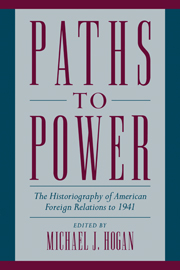Book contents
- Frontmatter
- Dedication
- Contents
- The Authors
- Preface & Acknowledgments
- 1 Introduction
- 2 New Directions in the Study of Early American Foreign Relations
- 3 The Great American Desert Revisited: Recent Literature and Prospects for the Study of American Foreign Relations, 1815-1861
- 4 Coming to Terms with Empire: The Historiography of Late Nineteenth-Century American Foreign Relations
- 5 Symbiosis versus Hegemony: New Directions in the Foreign Relations Historiography of Theodore Roosevelt and William Howard Taft
- 6 The Reclamation of Woodrow Wilson?
- 7 Reaching for the Brass Ring: The Recent Historiography of Interwar American Foreign Relations
- 8 The United States and the European War, 1939-1941: A Historiographical Review
- 9 The Origins of the Second World War in Asia and the Pacific: Synthesis Impossible?
- Index
6 - The Reclamation of Woodrow Wilson?
Published online by Cambridge University Press: 12 October 2018
- Frontmatter
- Dedication
- Contents
- The Authors
- Preface & Acknowledgments
- 1 Introduction
- 2 New Directions in the Study of Early American Foreign Relations
- 3 The Great American Desert Revisited: Recent Literature and Prospects for the Study of American Foreign Relations, 1815-1861
- 4 Coming to Terms with Empire: The Historiography of Late Nineteenth-Century American Foreign Relations
- 5 Symbiosis versus Hegemony: New Directions in the Foreign Relations Historiography of Theodore Roosevelt and William Howard Taft
- 6 The Reclamation of Woodrow Wilson?
- 7 Reaching for the Brass Ring: The Recent Historiography of Interwar American Foreign Relations
- 8 The United States and the European War, 1939-1941: A Historiographical Review
- 9 The Origins of the Second World War in Asia and the Pacific: Synthesis Impossible?
- Index
Summary
Sitting on the Senate Foreign Relations Committee in 1989, Daniel Patrick Moynihan apparently could not resist baiting the witness. If it was now obvious that RussoAmerican relations were to be conducted by “the normal means of compromise and accommodation,” what then, Moynihan mused, are we to make of Woodrow Wilson's legacy? “I was long skeptical about Wilson's vision,” answered the witness. “But I begin today in the light of just what has happened in the last few years to think that Wilson was way ahead of his time.”
Moynihan's prey here was George Kennan, the dean of American realism and an initiator in the early 1950s of two generations of biting criticism of Woodrow Wilson, and his comments, accordingly, raise the possibility that much of what has been written on Wilson in the last half Century is obsolete. Today's main currents - economic globalization and the momentum of political liberalization - appear to have ushered in a Wilsonian world. The end of the Cold War gutted Kennan's realist critique, because America's security has vastly improved as its national ideals have prevailed - quite the opposite from how Kennan thought about these matters. At the same time, the sting of New Left revisionism, which always rested heavily on the claim that Wilson's Open Door was a fagade for the extension of American power, has worn off. Third World guerrillas, now in power, court Chicago School economists and bow to International Monetary Fund austerity demands - Franz Fanon has given way to financial prudence. N. Gordon Levin's Woodrow Wilson and World Politics no longer carries strength as a timely critique of neo-imperialism. Instead, it conjures up images of the cranky old Trotskyite in the back of the room who keeps blathering about “class struggle” while everyone eise shifts impatiently. History itself has humbled George Kennan and William Appleman Williams.
These new conditions have tempted writers in the last decade to vindicate Wilson. It is a telling indication of how much has changed that within a decade the attempts to define the Wilsonian tradition in American foreign relations have moved from Lloyd Gardner's highly critical A Covenant with Power to Thomas Knock's laudatory To End All Wars.
- Type
- Chapter
- Information
- Paths to PowerThe Historiography of American Foreign Relations to 1941, pp. 148 - 175Publisher: Cambridge University PressPrint publication year: 2000

